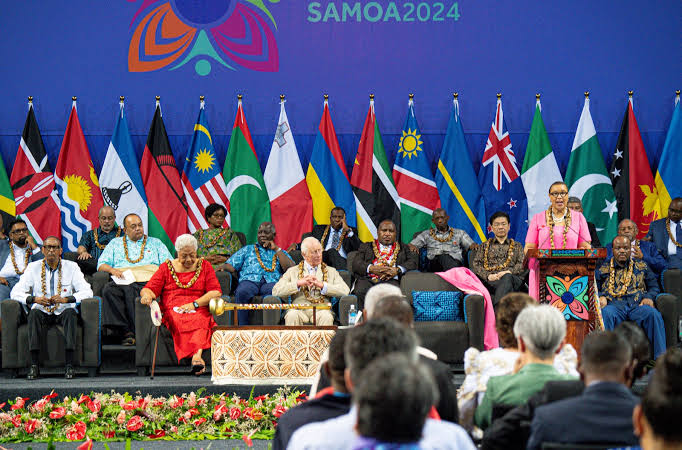
The State of the Commonwealth
By Femi Olugbile
There once was a time when ‘Britannia ruled the waves’, and the British Empire, the largest in human history, extended over a quarter of the world’s surface, and almost a quarter of its population. British power and culture held sway over much of the known world.
From 1887, representatives of subject countries designated as British Dominions, were invited to conference with the reigning monarch.
At the 1926 conference, the Dominions agreed to form a community of equal members of the British Empire, under the British Monarch. That community became known as the British Commonwealth.
As the years went on, most of the territories previously under the British Empire became independent countries.
King George VI was the first Head of the Commonwealth, and he was succeeded by Queen Elizabeth II, who reigned until her death in 2023.
Contrary to popular assumption, the British Monarch is not, technically, the automatic head of the Commonwealth. President Idi Amin Dada of Uganda had once quipped that he saw no reason why he, instead of Queen Elizabeth, should not be head of the body. It is not on record what response he got from the British Crown.
A few weeks ago, the Commonwealth held its 27th Heads of government (CHOGM) meeting in the idyllic Pacific Island of Samoa, the first such meeting since the death of Queen Elizabeth II. King Charles II, her son, showed up as the head of the Commonwealth.
The meeting was significant because of the people who attended, and those who did not. President Narendra Modi of India, and President Cyril Ramaphosa of South Africa, leaders of two of the original ‘Dominions’ who had been regularly holding conference with the Monarch since 1887, were absent from Samoa. They were attending the meeting of BRICS – the new alignment of rising ‘non-aligned’ economic powers whose core was formed by Brazil, Russia, India, China and South Africa, but to which a number of other significant nations including Egypt, Ethiopia, Iran and United Arab Republic had recently hitched their wagons. BRICS was meeting in Kazan, Russia.
In Samoa, ministerial meetings took place from 21st October 2024, building up to the meeting of the Heads of Governments from 25th to 26th of October. The main theme of the gathering was ‘Transforming our Common Wealth’. Among the objectives was to ‘strengthen resilient democratic institutions, upholding human rights, democracy and the rule of law’. Combating Climate Change, especially in terms of its impact on small island nations such as Samoa, was slated to be a discussion point. There was also going to be an election for a new Secretary-General to succeed Patricia Scotland, the incumbent.
The issue of Reparations – compensation in the form of payment or some other modality, along with a formal apology, to the descendants of slaves for the harm inflicted on them by Slave Trade was not on the agenda of the summit. But as the date neared, there was a strong rumour eddying about that it would be the dominant discussion topic, and that it might even make or mar the gathering.
It was a touchy subject. A spokesman from Jamaica, one of the Caribbean nations most vocal on the demand for Apology and Reparations, had announced that Reparations would be on the agenda. On the eve of the conference, Keir Starmer, Prime Minister of the United Kingdom, denied that Reparations was an agenda item, and indicated, in the usual patronising manner of British ruling class towards other nationals, that Britain would be helping poorer Commonwealth nations with climate resilience and building a better future, rather than thinking of any apology for its historical Slave Trade.
One fact stood out. There was no unanimity of views on the most important challenges confronting the Commonwealth, or even on the rationale for its future existence.
King Charles was suave and tentative in his opening address, walking a delicate path. He sensed the mood of the gathering, and was aware he could not simply side-step Reparations, the elephant in the room. Everyone knew how the profits from slavery and the exploitation of the wealth of foreign lands had been parlayed by his ancestors into the great buildings of the city of London and the building stones of a mighty Empire.
‘…I understand from listening to people across the Commonwealth how the most painful aspects of our past continue to resonate. It is vital…that we understand our history, to guide us toward making the right choices in the future…’
It was the closest he could go to an apology, without the political authorisation of his government.
The Ghanaian foreign minister Shirley A Botchwey was chosen as the next Secretary-General.
An ‘Apia Commonwealth Ocean Declaration for One Resilient Common Future’ was adopted.
The invisible but omnipresent elephant of Reparations for Slavery and Colonialism was eventually addressed in the joint communique, in the most general of terms.
‘Commonwealth States…in both the Atlantic and Pacific…share common historical experiences in relation to this abhorrent trade… agreed that the time has come for a meaningful…conversation towards a common future based on equity…to address the harms of slavery…’
A number of questions are left hanging.
Is the Reparations crusade based sentimentally on a demand for redress of past injury and racial offence, or economically on the fact that the modern wealth of the Western world is founded substantially on ‘stolen’ African mineral riches and unrequited black labour?
Would Britain always be the captain of the ship?
Would Charles II and his successors continue to preside over the Commonwealth, even when, as predicted, India becomes a world power, bigger than Britain, and when the GDP and World Trade ranking of Nigeria surpass those of the UK, in the fullness of time?
Is the Commonwealth a sentimental relic of a disappearing past, and are new partnerships such as BRICS the way of the future, as Ramaphosa and Modi seemed to suggest by ‘voting with their feet?’
The future is at once mysterious and tantalising.
